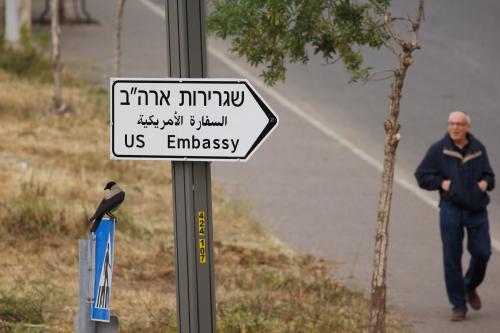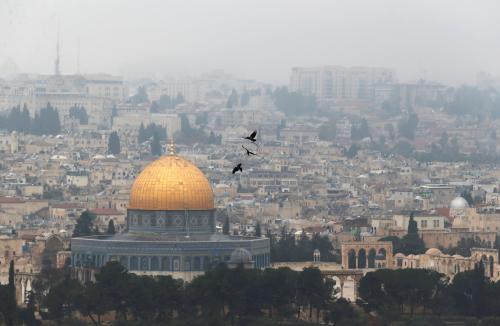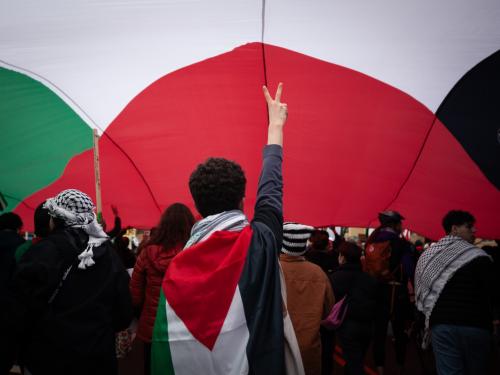Within less than a generation, both the political significance of the Nakba and the roots of the Israeli-Palestinian conflict were all but forgotten in Washington, writes Khaled Elgindy. This piece originally appeared in Foreign Policy.
This week’s protests at the Gaza border were the largest—and deadliest — since Palestinians began what organizers have dubbed the “Great March of Return” some six weeks ago. The protests culminated on May 15, the 70th anniversary of the Nakba (“catastrophe”), during which most of Palestine’s Arab population was expelled from the British-mandated territory in the course of Israel’s creation. Approximately 70 percent of Gaza’s 2 million Palestinians are registered refugees from lands in what is now Israel.
Israel has long denied responsibility for the Palestinian refugee problem and continues to maintain that the refugees will never be allowed to return, and American policymakers now generally accepted the Israeli view. But this was not always the case. Unlike today, in the years immediately after 1948 neither the events of the Nakba nor the U.N.-mandated right of Palestinian refugees to return to their homes was considered controversial in U.S. politics. Within less than a generation, however, both the political significance of the Nakba and the roots of the Israeli-Palestinian conflict were all but forgotten in Washington.
Seventy years later, a similar process of denial is now happening—albeit at a slower pace—in relation to Israel’s half-century occupation of the West Bank and Gaza. The steady erasure of the Israeli occupation from Washington’s political discourse not only makes it impossible for the United States to resolve the conflict but places Israelis and Palestinians on a seemingly irreversible path to one state.
Although the term nakba never entered Washington’s political lexicon, U.S. policymakers understood the nature and scope of the calamity that befell Palestinians during Israel’s creation. At the time, U.S. diplomats and intelligence officers closely monitored and reported on developments in what was then British Mandate Palestine as events unfolded. Most senior U.S. policymakers therefore, including the president and secretary of state, had no illusions about the nature of the Palestinian exodus.
In the wake of the Deir Yassin massacre, in which more than 100 Palestinian civilians were killed by members of two Zionist militias—the Irgun and the Stern Gang—the trickle of refugees became a full-blown exodus. Thereafter, the U.S. State Department kept regular tabs on the numbers and conditions of Palestinians fleeing the area. When the first U.S. representative to Israel, James G. McDonald, repeated Israeli claims that Palestinians fled as a result of the invasion of Arab armies, it was Secretary of State George Marshall who set him straight. Marshall reminded the representative that the “Arab refugee problem … began before outbreak of Arab-Israeli hostilities. A significant portion of Arab refugees fled from their homes owing to Jewish occupation of Haifa on April 21-22 and to Jewish armed attack against Jaffa April 25.” Marshall’s message went on to warn that the “leaders of Israel would make a grave miscalculation if they thought callous treatment of this tragic issue could pass unnoticed by world opinion.”
Like the rest of the international community, the United States supported U.N. General Assembly Resolution 194, which among other things called on Israel to allow the Palestinian refugees “wishing to return to their homes and live at peace with their neighbours should be permitted to do so at the earliest practicable date.” According to President Harry Truman’s Middle East peace envoy, Mark Ethridge, Israel bore “particular responsibility for those who have been driven out by terrorism, repression and forcible ejection.” Many acknowledged U.S. culpability as well. The U.S. consul in Jerusalem, William Burdett, complained that “the United States has accumulated an enormous moral and even financial responsibility in the situation in our justifiable zeal for creation of a [Jewish] state.” Even Truman, revered by many as the midwife of the modern Israeli state, conceded that he was “rather disgusted with the manner in which the Jews are approaching the refugee problem.”
Over the years, however, the sense of urgency over the Palestinian refugee crisis began to fade, as did the memory of what created it. Nevertheless, successive U.S. administrations continued to view a resolution of the refugee issue as the key to an Arab-Israeli peace settlement. It was President Lyndon B. Johnson who marked a distinct departure from his predecessors. Unlike the three presidents who came before him, Johnson made no serious attempt to address the refugee issue. Thus, when Israelis diplomats notified the State Department in 1966 that Israel would no longer entertain any proposals that involved repatriation, which henceforth would be considered tantamount to calling for Israel’s destruction, the Johnson administration was unfazed. Indeed, Johnson’s own views tracked closely with those of Israel’s leaders. In his memoirs, Johnson castigated Arab leaders for failing to absorb the refugees and for using “the issue of Israel and the tragic plight of the refugees to advance personal ambitions and to achieve the dominance of Arab radicals over Arab moderates.” Gone was any reference to Israel’s responsibility in the creation of the refugee problem or to American involvement in it.
The same type of historical and political amnesia that effectively erased the Nakba from Washington’s political consciousness half a century ago is once again taking hold among U.S. politicians—this time in relation to the Israeli occupation. Since 1967, U.S. policy and the Middle East peace process have been based on U.N. Security Council Resolution 242, which called on Israel to withdraw from lands it occupied, including the West Bank and Gaza, in return for peace and normalization with neighboring Arab states. Since 2000, the United States and the international community have interpreted Resolution 242 in the context of the creation of a Palestinian state in the West Bank and Gaza alongside Israel.
Bill Clinton was the first U.S. president to make support for Palestinian statehood a matter of unofficial U.S. policy. The policies of ending Israel’s occupation and establishing an independent Palestinian state were formalized by George W. Bush. Barack Obama later reiterated the positions of his predecessors, though by this time they were no longer a matter of bipartisan consensus. Thus, in 2011, when Obama called for a two-state solution with the stipulation that the “borders of Israel and Palestine should be based on the 1967 lines, with mutually agreed swaps”—essentially paraphrasing language used by his predecessor—he was met with wild outcry from congressional Republicans and charges of having thrown Israel “under the bus.” In 2016, the Republican Party formally expunged references to a two-state solution from its party platform while declaring that it “reject[s] the false notion that Israel is an occupier.”
The election of Donald Trump has only accelerated this trend. Trump’s ambassador to Israel, David Friedman, maintains strong ties to Israel’s settler movement while downplaying what he calls Israel’s “alleged occupation” of the West Bank. While Trump has not been so explicit, neither has his administration expressed unambiguous support for Palestinian statehood or for ending Israel’s occupation, as each of the last three U.S. presidents have done. Trump has said only that the United States would support a two-state solution “if agreed to by both sides,” while the administration’s much-anticipated peace plan seems to envision something less than full Palestinian sovereignty. The decision by the State Department to drop references to the West Bank and Gaza as “occupied territories” from its annual human rights report suggests that occupation denial is coming alarmingly close to being normalized at the official level.
The motivation behind this denial is not difficult to discern; if there is no occupation, as such, then there is no need for Israel to relinquish any of the territory it now controls. The discourse of occupation denial and Israeli triumphalism that seems to have taken hold on both the Israeli and American right is equally problematic for Israel and its supporters however. For if the West Bank, East Jerusalem, or, for that matter, Gaza is not occupied, the only other way to understand continuing to control millions of people while denying them basic citizenship rights would be as a form of apartheid. Indeed, by negating the occupation, these modern-day revisionists inadvertently highlight the one-state reality that exists today in which Israel maintains effective control over all of the territory between the Mediterranean Sea and the Jordan River. On one side are roughly 6.5 million Israeli Jews with full citizenship rights living on both sides of the 1967 line and on the other an almost equal number of Palestinian Arabs with varying degrees of legal and political rights. Without the prospect of an independent state of their own, Palestinians will inevitably gravitate toward the demand for equal citizenship rights in an Israeli state, a trend that is already well underway.
Despite the similarities, today’s political amnesia is unlikely to take hold completely—not only because digital technology has made it virtually impossible to forget anything but because, unlike the period after 1948, there is now political resistance to forgetting. Recent years have witnessed a shift in U.S. public opinion toward greater awareness, recognition, and support for Palestinian rights, particularly among younger, progressive, and female voters, as well as people of color and liberal Jews. Whereas in the past, the process of forgetting the Nakba, the rights of refugees, and our original understanding of the conflict was more or less universal, today’s occupation denial is largely a partisan exercise and is increasingly being met with resistance among liberal and progressive Democrats, such as Sen. Bernie Sanders and Rep. Betty McCollum.
Unless U.S. policymakers are prepared to take a clear-eyed—and honest—approach to Israel’s prolonged military occupation of the West Bank and East Jerusalem, as well as the long-neglected issue of Palestinian refugees, the United States will have little to offer in the way of peacemaking. Just as decades of ignoring the plight of Palestinian refugees in Gaza and elsewhere have not succeeded in taking that issue “off the table,” denying the existence of Israel’s occupation is likely only to produce more problems down the road.







Commentary
Political amnesia in Washington: From the Nakba to the occupation
May 18, 2018